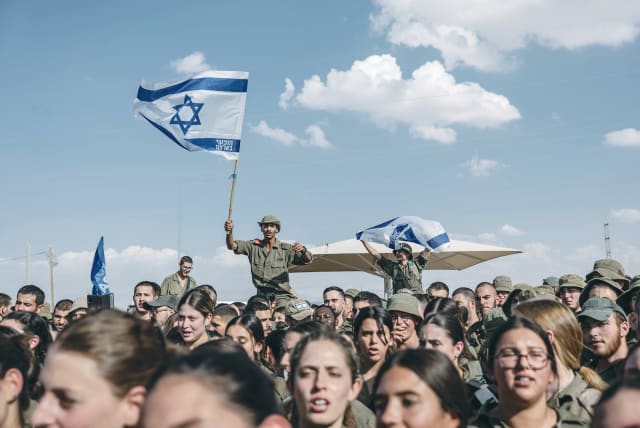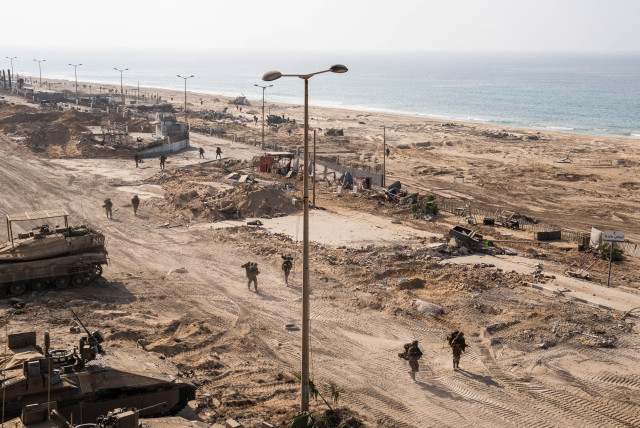Israeli society has shown enormous resilience in response to Hamas massacre - opinion

We can be confident that Israeli society will be dramatically different after October 7. What we cannot know is what change is going to look like.
The generation raised during The Great Depression of the 1930s, that defeated Nazi Germany in the 1940s went on to rebuild the UK and the US in the post-war era. They became known as the Greatest Generation and were inspired to greatness in the face of adversity and evil.
In the wake of the Yom Kippur War of 1973, Israel witnessed tectonic societal changes, whose effects are still felt. One wonders whether the heroic response of Israelis to the shock and awe of the Hamas attacks of 2023 will carry society into a new era, changing the course of the country’s history. In these days of trauma and war, there may be room for optimism.
Generation V
Uvda is Israel’s equivalent of 60 Minutes. In its first episode following the October 7 atrocities, it obviously focused exclusively on the events of Simchat Torah and the immediate aftermath.
One of the stories it told was of the first group of paratroopers to arrive on the scene via helicopter and the near-death experience for the entire platoon as they were hit by two Hamas rockets while attempting to land.
The platoon commander described the ensuing battle with Hamas to retake the Israeli settlements and towns, and shared his thoughts about the ground offensive in Gaza to come. Simply put, he told the interviewer that he was ready to die defending Israel – “I told my grandmother, you have your great-grandchildren, someone must defend them. That someone is us, the ‘Tik-Tok Generation?” It would seem not.”
In the message to the troops entering Gaza, the head of the IDF Southern Command described the forces as the Generation of Victory. There has been an endless stream of heroic stories since the tragic events of October 7. Civilian defenders of the kibbutzim who fought alone for hours on end with minimal arms and ammunition, officers and soldiers who leaped from their homes early on Black Shabbat, and of course the hundreds of soldier casualties, men and women who were either wounded or have fallen in combat since it started.
As the IDF prepared for the Gaza ground maneuver one cannot but be inspired by the soldiers and officers. The over 100% turnout of the reservists and the steely resolve of the hundreds of thousands of troops knowing they may have to make the ultimate sacrifice to defend Israel is truly awesome.
At the heart of the IDF is a generation of officers deeply committed to Israel, and highly motivated by Zionist values, including many graduates of a network of post-high-school institutions set up to prepare young Israelis for army service: boys and girls, religious and secular.
The graduates of the mechinot (pre-army courses) not only serve, but volunteer for the most demanding roles, on and off the battlefield. Many of them will serve well beyond the minimum time required by law, often opting for officer training and years of service. They are characterized by their motivation and the get-it-done attitude.
When they return to civilian life, history shows that they will be instrumental in shaping the future.
Civic explosion
The response to the catastrophe is not limited to a hyper-motivation to serve in the army. The civic response and the spirit of volunteering have been a sight to behold. The Association of Civic-Military Studies in Israel carried out a survey three weeks after the war began. They found that over 50% of the Jewish population has already been involved in some form of volunteering. Entire organizations have been created from scratch dealing with logistics, military supplies, transportation, and a myriad of other social and welfare services.
Somewhat symbolic of the dramatic pivot Israeli society has made is “Achim Leneshek” one of the central and most aggressive groupings of the anti-legal-reform movement. It turned itself overnight into an enormous civic organization dedicated to the war effort. Its services range from a massive volunteering effort to help with agriculture to the use of advanced technology to help families of the missing and hostages discover the fate of their loved ones.
Increasing circles of grief
The amount of grief and trauma caused by the loss of life, the horror of kidnapped loved ones and those who still don’t know the fate of family members is on a scale never seen before. Even the Yom Kippur War did not have such an immediate and dramatic impact as we have seen in the first few days of the conflict.
The devastation has left entire communities in the shock of collective trauma requiring some form of national recovery and rehabilitation which will include physical, emotional, and communal needs. It goes without saying, that there is also a massive breach of trust within the country and the powers that be, militarily and politically. This too will be a huge concern as time unfolds. This community will form an important driver of social change. Morally it will be hard to ignore their voice.
The aftermath of 1973
Many have already compared the events of October 2023 to those of October 1973. Most obviously this is due to the surprise attack and to the intelligence and military failure. One can assume that there will be other similarities. As in 1973, there is an understanding that people’s basic assumptions about Israeli life will change. This will not be limited to military or security aspects, nor even the political map (although of course it will include both).
Post-1973 there were enormous social changes. In 1974, Gush Emunim was founded and became the dominant force in building new settlements in Judea, Samaria, and Gaza. In 1976, a new political party emerged that altered the face of Israeli politics forever. Middle-class voters, sick of the Labor Party, both due to corruption and also the handling of the Yom Kippur War, founded Dash (Democratic Movement for Change), which helped reshape the politics in Israel.
The movement of Israelis becoming more religious also gained momentum the following year with many disillusioned secular Israelis finding their way into the Haredi community while a steady stream of Israelis left the country. All of these changes, and more, had a deep and lasting effect on Israeli society.
We know that we don’t know
We can be confident that Israeli society will be dramatically different after October 7. What we cannot know is what change is going to look like. The generation that is heroically defending the country, and the generation that is recreating civic society, will likely lead to new movements and ideas as the country faces economic, physical, emotional, and spiritual renewal. The hundreds, if not thousands of bereaved families and uprooted communities, along with the families of the hostages, will likely be a powerful social force for change, and not necessarily along the traditional political or religious lines.
Israeli society has shown enormous resilience in response to the terrible events of Simchat Torah, and we cannot know where that will lead us. If this tragedy generates a new confidence and optimism with a shift from the cynical politics of our era, then the future of Israeli society may be brighter than it currently feels. If Generation V becomes Israel’s Greatest Generation then we have much to look forward to.
The writer is a founding partner of Goldrock Capital and the founder of The Institute for Jewish and Zionist Research. He is a former chair of Gesher, World Bnei Akiva, and the Coalition for Haredi Employment.
Jerusalem Post Store
`; document.getElementById("linkPremium").innerHTML = cont; var divWithLink = document.getElementById("premium-link"); if (divWithLink !== null && divWithLink !== 'undefined') { divWithLink.style.border = "solid 1px #cb0f3e"; divWithLink.style.textAlign = "center"; divWithLink.style.marginBottom = "15px"; divWithLink.style.marginTop = "15px"; divWithLink.style.width = "100%"; divWithLink.style.backgroundColor = "#122952"; divWithLink.style.color = "#ffffff"; divWithLink.style.lineHeight = "1.5"; } } (function (v, i) { });

